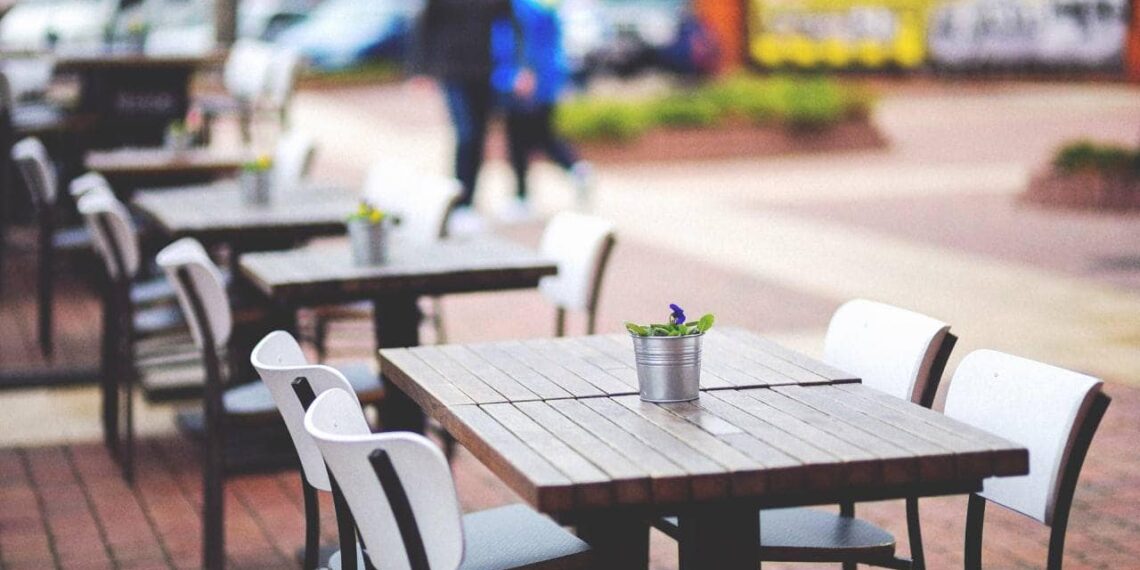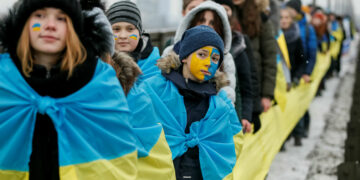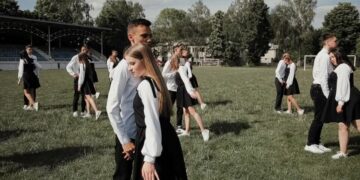As our country faces the harsh realities of war, a question lingers: Do we have the moral right to seek leisure, attend concerts or the cinema, or enjoy dinners at restaurants? Can we allow ourselves moments of happiness when many Ukrainians are enduring unimaginable struggles and sacrifices? Is it selfish to find joy amid such suffering, or is it a form of resilience—a testament to our spirit and hope for the future? Balancing personal well-being with the collective hardship of the nation is complex. Perhaps our pursuit of happiness, when done thoughtfully, can be a quiet act of defiance against the darkness of war.
Marusya Shcherbyna:
The question about entertainment during the war is painful for many people. We always have doubts whether it is normal to go to the cinema, celebrate or go on vocations. However, some people do not have any hesitations and live as if there were no war.
I believe that the answer to this question, like to many others, is balance. Obviously, we need to have happy moments and enjoy the life we have. It is significant to relax, as long as our psychology needs to be healthy. Little things, such as a cup of coffee every morning, can maintain our mental well-being.
However, I am also sure that forgetting about our reality is wrong. We must remember the price of our happiness and keep working for it. Volunteering and donating money to the armed forces are one of the best ways to be involved in the process of defending our country, our cultural heritage, our people.
All in all, we definitely have to take care of our physical and mental health, but it is also crucial to remember the reality we live in and take responsibility.
Anastasia Holovko:
We absolutely have that right because it is important for us to keep remains of our mental health. We are all traumatized because of war, and need to have rest in such activities. If we do not have the ability to feel that some things is relatively stable, we will become crazy. It is like ‘yep, we go out, and every moment can be our last moment, but we still can enjoy a cup of coffee in our favourite cafés or concert of a favourite band, and it is like it was in our past when it hadn’t been war in Ukraine’. So, I think, we not only have this right, we need it more than before to keep our mind. Personally, I send money to our army every time when I go somewhere to relax to thank our troops for possibility to live my relatively calm life. It is not unfair or immoral to have rest, but we shouldn’t forget about war and our army at all, because if we do this, all our cities will be occupied, destroyed or stayed on the front line in some time.
Alina Hostar:
For me, it is a very painful topic to talk about, but I can try. Now I’m feeling a growing anxiety about myself, since I’m not a soldier or a war nurse or any helpful person. Since I had become eighteen, I had been thinking about leaving all and going to military forces, but my mum stopped me. She told me that it will ruin my future if I didn’t finish my degree, so I changed the plans, but I regret it every day. I feel small and insignificant, more like a parasite to my country. I don’t think that I will be ready to have a traditional holiday until the end of the war. I try to focus all of my attention on studying to just stop thinking about things like that, but sometimes it is inevitable. I’m afraid, I’m anxious, and I feel like all of it is partially my fault.
Denis:
It might seem tempting to say that attending entertaining establishments has to be, at least from a moral point of view, prohibited, however we also should not forget about the importance of maintaining of economics by spending money and therefore paying taxes to the budget of a state. It is unfair to enjoy life, knowing that multiple people around you suffer. War is full of injustice, and yet people keep living. Some people lost their homes, some people made a fortune on selling weapons. The world is full of injustice, and yet people keep living…
Evelina:
Recently I had attended a lecture at PinchukArtCentre in Kyiv and the professor voiced a really important idea: unless we create culture and practice culture, the Ukraine our soldiers are fighting for will cease to exist. Nowadays, a lot of people are hungry for the freedoms and opportunities that just aren’t available over here. So while the government’s priorities are set straight towards the military goals, all the amazing people who do and support art are making sure there is a population left to be protected. Unless we let ourselves live a little, the warriors won’t have a home to go back to, and continue living like we all deserve to live.
Sasha Ferenets:
These days in Ukraine the line between everyday routine and tragedy is extremely blurred. We enjoy little happy moments of our lives in the context of terrible acts of russian terrorism happening all around the country. From the side it may seem abnormal and twisted. However in my opinion it is the opposite – a very human thing. We cannot help but enjoy life despite the conditions. Forsing ourselves out of it just to fit into the image of “war” (the alternate reality that never existed) created by the popular culture would be cruel and traumatizing. I strongly believe that our lives are too valuable to not be enjoyed, as long as we are helping the army and our actions fit into the norms of morality.
Anna Haidai:
The question of permission appears when people start comparing experiences. My father once told me that civilians live peacefully, while soldiers can’t do it that way. However, as dad told me, we all share the same war, and everyone should feel something like the front-line experience. But there’s a problem: Ukrainians didn’t choose this war. We didn’t start it. My father’s decision to become a soldier was a conscious choice. But does everyone have to make that desire?
There is a belief in a “shared experience” that all Ukrainians are going through. We are in the same war, in the same country, carrying the same ideology. But is this really the case?
In theory, we all strive to resist Russia’s aggression. In practice, each of us takes on different tasks and goes through different wartime experiences. Some leave the country, others take up arms, while some teach children in schools. Some sleep in beds, some in corridors, and soldiers – in trenches. The one thing we shouldn’t do is try to compare these experiences.
This point can be interpreted from two perspectives. First, living a civilian life in Ukraine still means living in a war. Even if your financial situation hasn’t suffered, and you can afford to go to a café or visit Paris during the weekend, trying to maintain a normal life doesn’t spoil the impact of the war. Second, it’s important to understand that every Ukrainian has a different experience of the war. The common things we may share are an idea and an enemy, but not the experience itself.
Each of us has the responsibility to take care of our mental health and be useful to the community. If that means taking a break, then why not? There’s no need to feel guilty about going to a café or a movie. Resting doesn’t mean being detached from the war.
What’s more, Ukrainian business needs our support because the war helped us create our modern culture: literature, music, cinema. We have finally moved away from Russian series, insta blogs and songs.
Yelyzaveta Shramko:
I think, we do have the right to live our usual life, but only on one condition: we must never forget about the war that’s still going on. You see, our soldiers are fighting every day for us to have an opportunity to live and work, have fun and meet the new day every morning. They are doing this so Ukraine doesn’t fall into the abyss of pure nightmare and horror. Someone has to carry on the joy of life, even if it’s sometimes hard.
However, while continuing our usual life, we also have to do something for the development of our country. Whether it’s volunteering, participating in various projects, developing ukrainian culture and science or sinply working and paying taxes. If we do that, if we remember about the war and contribute to the growth of Ukraine and its society, then yes, we have the right to use that opportunity to enjoy life, for which our army fights every day.
Sofiia Samborska:
It is impossible to live on the top of Everest. And trying to survive now without any rest, fun, joy, or pleasure is similar to trying to stand on the top of the highest mountain in the world. So I believe the time we spend with our friends in cafes, the evenings we go to the cinema, the days of short trips, and the hours of quiet reading is our accouterment that keeps us warm on the top of this mountain of fear, loss, stress, pain, and anger. However, while we are having fun and resting we should respect others and keep in mind that war traumatized us all in different ways. We should be more sensitive than ever in our attitude toward other people and try to not harm them.
Maria Klitynska:
I don’t have an answer to this question. I want to start talking about the limit where you should clearly understand that you need rest for effective work, which later needs to be directed to the needs of the army (volunteering, fundraising, blood donation). But let’s be honest, I haven’t achieved this balance in several years of the war and it’s getting harder and harder for me to believe that it is possible. I can give myself a “rest” but after a week I can be consumed by guilt. In times of war, we all feel like we’re not doing enough, we’re all drowning in guilt (just varying levels of it), even though some of us are doing the impossible. I am alive thanks to our soldiers and I will carry this gratitude with me throughout my life and will convert it into actions. Only in this way we will one day truly rest together.
Viktoria Romas:
This is an extremely difficult question, the answer to which I have been searching for almost three years. First of all, it is necessary to understand that Ukrainians have adapted to life in such conditions during three years of full-scale war. Our psyche is trying to find some support so that we can function normally. People always adapt to the conditions in which they have to live. For us, war is routine. Therefore, it is not surprising that some things, such as air alarms, do not move us. And it is equally clear that if our reality is a state of war, we must find ways to live on. People need to go to work and earn money, get an education, visit relatives, create families and have children.
It is also no wonder that we cannot be afraid and were in despair around the clock. It is impossible because we would go crazy. I think it is a protective mechanism of our mental health – to try to find stability in turbulent conditions. That is why we ask ourselves the question: have we not forgotten about the war and can we rest?
I realized the following thing for myself: I should not suffer every minute, but I should do everything I can to help the army and my people.If I am not at the front and I am not in the occupied territory, then I will do what will benefit Ukraine. I send donations to the army, I study at the university in order to develop Ukrainian culture and our society through my work. War does not mean that we do not have the right to a cup of coffee in the morning, but it does not mean that we should assume that the war will be won for us. Victory will be won only by joint efforts. Therefore, ask yourself every day what exactly you can do to help our country.
Oleksandr Kravchenko:
In times of war, it’s essential to strike a balance between living our lives and remaining conscious of the sacrifices being made on the frontlines. Entertainment, leisure, and normalcy shouldn’t come at the cost of forgetting the harsh realities of conflict. It’s not about abandoning joy, but about intertwining it with responsibility. Enjoying the freedoms and opportunities we have must go hand in hand with acknowledging why we are able to do so—because of those risking their lives to defend them.
We have a moral obligation to support our soldiers and honour their sacrifice, whether that’s through donations, attending rallies, raising awareness, or continuously speaking out about the atrocities committed by Russia. Every act of resistance—no matter how small—contributes to the collective effort.
We must never lose sight of the reason behind our relative peace. Soldiers on the frontlines wouldn’t want to return to a nation mired in despair, but they would also not want us to be oblivious to the war’s cost. So, yes, live your life. Go to cafes, watch films, celebrate moments of joy, but never forget who makes that possible. If we allow ourselves to enjoy these moments, we must also commit to supporting those who ensure our safety, be it through advocacy or direct action. To indulge without contribution is to turn away from the very people fighting to preserve these freedom.
Veronika Shevych:
Unfortunately or fortunately, we are very selfish by nature, so we cannot exist and live happily just by using altruistic resourses – it will cause emotional burnout sooner or later . We all need some retreat at some point, so if we do need to entertain ourself by going to the club with friends or buy your favorite sweet treat – let it be. In the other hand, we also cannot forget about the world around us, so charity and reposts of different fonds is the bare minimum which we must do. As students, it wouldn’t be a considerate desicion to join the meletary, but we can find another ways to help – long-term volonteering, draw the attention of foreigners to the problem, being the part of different rallies.
So, what am I trying to say – we don’t need to forget both about people who suffer and ourself, we need to find a balance so our help will be lond and effectual.
Anastasiya Chepeleva:
This is a very thoughtful question with a complex answer. It’s natural to feel conflicted about enjoying life’s little moments, like going to a cafe or watching a film, while knowing others are facing intense struggles. I reckon that soldiers who are sacrificing their lives every single day would like to see what for they are doing that. And then it comes to us. What we are creating currently, what world we want to live on, with what values and attitudes. We can not omit some tiny thing which make us happy. Nevertheless, we are to become the society which can be worthy of that daily sacrifice. The world that we are constructing now is going to reflect our future. We are in charge of it. So it’s crucial to strike a balance between daily life with it’s satisfactory things and also some actions to assist in defeating enemies, especially their propaganda. So that can be volunteering, blood donation, raising cash for some army needs, researching our cultural treasures and so on.
Sofia Holovko:
I am not ready to articulate this question widely, because it is too complicated, too private and painful. What I can say is that we should fulfil whatever needs we have as far as we’re convinced that we are involved. That we know our role and take part. That we do not separate ourselves from reality. At the same time, I don’t know where to seek for the indicator which will show that I am doing enough. I am not sure that I will figure it out at all. For now, I don’t have a concrete answer to this question.
Nastya Klymenko:
Since the invasion started I always have a feeling that world is collapsing right now — in the background of somehow “normal life”
I don’t think that I can be happy, while there is a war in my country. I just can’t let myself be happy while a lot of Ukrainians are defending my home and dying for that home.
But I learnt how to feel a joy that could boost my productivity and volunteer activities. While I’m donating, organising events to fundraisers money for Ukrainian Armed Forces I feel that I do something important. That makes me feel better.
And, of course people, my job. That are two things that make me believe in a bright and happy future.
Kateryna Kotiva:
My brother is now a soldier in the Ukrainian Armed Forces, and he once told me: “It won’t make me feel any better if you sit here and grieve.” And I think this is the answer.
We can go to cafés and concerts, but we must always remember who made it possible.
The problem does not appear when we try to relax. The problem appears when it is the only thing we do.
Sofiia Samborska:
It is impossible to live on the top of Everest. And trying to survive now without any rest, fun, joy, or pleasure is similar to trying to stand on the top of the highest mountain in the world. So I believe the time we spend with our friends in cafes, the evenings we go to the cinema, the days of short trips, and the hours of quiet reading is our accouterment that keeps us warm on the top of this mountain of fear, loss, stress, pain, and anger. However, while we are having fun and resting we should respect others and keep in mind that war traumatized us all in different ways. We should be more sensitive than ever in our attitude toward other people and try to not harm them.
Sofiia Chornopolska:
Some people say that considering the war-caused devastation, we have no right to enjoy happy moments. So, should we live in a constant state of despair just to have the right to be seen as victims? I guess that the healthy thing is rather living with happiness and grief at the same time. This is, probably, the point where Western society stops understanding us: the coexistence of oppositions in our everyday lives.
During the early days of full-scale invasion, I happened to live in Lisbon. On Holodomor remembrance day, we gathered in the central square, held a discussion to memorize the current genocide, lit the candles, and went to the Ukrainian church a bit further away. At the time Lisbon was getting ready for Christmas: it was a fairytalish November evening with songs and dances on the streets. Walking silently with a Ukrainian flag on my shoulders, carrying a lit candle and a never-ending feeling of grief amongst the happiness of this city was quite the same thing as watching a good movie in Ukraine: it was absurd. It was, perhaps, the quintessence of this world.
While being abroad, I felt, say, like a lost fox. I had a feeling that the fire was lit, the forest was burning down, and I was not there. The guilt was agonizing, and running into the flames seemed to be the best way to put the fire out. But had I given up to the idea of renouncing my happiness, the consequence would be complete self-destruction.
So, isn’t it wiser to do all that’s in our power, while still being kind to ourselves and others?
It’s better to love the world we happen to live in as much as possible, even when the grief is immense.








